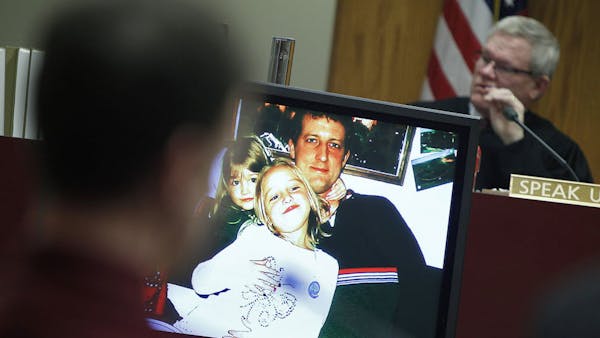HUDSON, Wis. – A mental health expert hired by Aaron Schaffhausen's defense team testified Tuesday that Schaffhausen was legally insane when he killed his three daughters.
John Reid Meloy, a San Diego-based forensic psychologist, determined Schaffhausen suffered "major depression" accompanied by personality traits that caused him to lack substantial capacity to conform his conduct to the law, Wisconsin's legal definition.
Schaffhausen pleaded guilty to killing his daughters — 11-year-old Amara, 8-year-old Sophie and 5-year-old Cecilia — at the girls' River Falls home in July. His attorneys are trying to convince a jury that he had a mental disease or defect and should be sent to a mental institution instead of prison.
Meloy's testimony followed that of a court-appointed mental health expert who on Monday said that Schaffhausen was not insane.
Meloy said he based his findings on reviewing the evidence, interviewing Schaffhausen for more than 10 hours on two visits and administering four psychological tests.
Although many people have depression, Meloy said, Schaffhausen had a personality disorder including prominent dependent and depressive traits, obsessive thinking, impulsivity, and narcissistic and borderline features.
"This is a complicated individual," Meloy said before a St. Croix County jury.
Schaffhausen committed rare "catathymic homicide," or something done in accordance with emotion, Meloy explained. He said that emotion, though, is not superficial — not anger at the moment or retaliation — but something deeper.
"Typically the person that has those deep feelings, they don't know why they're feeling that way but they know internally they feel like they're coming apart," Meloy testified.
Usually, it happens to people who have dependent personalities, a history of dependency and who have been rejected, he said.
Such homicides typically include a period of homicidal thoughts, an explosive violent act that's out of character for the person and then a feeling of relief.
Catathymic homicide involves a "narrowing of the mind," Meloy said, where the person feels the only option is suicide, homicide or both.
Schaffhausen was emotionally dependent on his ex-wife Jessica Schaffhausen, Meloy said, and in his mind their daughters represented that dependent link.
After Schaffhausen killed the girls, his attempts to care for them "goes to the heart of the catathymia," Meloy said. "How could somebody have these two states of mind and go from one to the other in such close proximity? … That goes to the heart of the issue of a lack of substantial capacity to conform his conduct to the requirements of the law."
Meloy said he believes Schaffhausen knew killing was wrong but couldn't control himself.
Meloy testified that Schaffhausen told him he didn't have thoughts or feelings when cutting the girls' throats, a condition that Meloy said is seen in military combat.
"If the feelings are intense enough, we don't feel," Meloy said. "We dissociate … it's like we're observing ourselves."
Later, he said, Schaffhausen seemed to be relieved.
"He did report to me in my interviews a sense of relief because now he'd done something that he could actually suffer for having done," Meloy said.
Under an afternoon of cross-examination, prosecutor Gary Freyberg raised questions about inconsistencies in Schaffhausen's accounts of the crimes and the threats leading up to them. He also questioned Meloy about Schaffhausen's actions that appeared to plan the crimes and the choices made by Schaffhausen at the time.
Schaffhausen had spilled gas in the house — one of his fantasies was to burn himself and his children in the house, Meloy said — but he turned off the switch to the furnace, Meloy acknowledged.
"I don't think he wanted to die at that point," Meloy said.
"He had the capacity to think about conduct and control his conduct when his own skin was at stake, didn't he?" Freyberg asked.
Defense attorneys were discussing their next moves Tuesday night, including whether Schaffhausen could take the stand.
Pam Louwagie • 612-673-7102
Teen charged with murder in deadly St. Paul shooting last month

Clash brewing over Lino Lakes development plan that includes mosque
Minneapolis City Council declines to endorse Frey's Third Precinct plan

